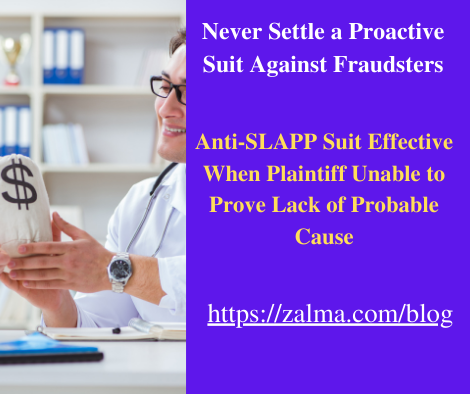-
News Feed
- EXPLORE
-
Pages
-
Groups
-
Events
-
Blogs
-
Marketplace
-
Offers
-
Jobs
-
Developers
Never Settle a Pro-Active Anti-Fraud Suit with the Fraudsters

Anti-SLAPP Suit Effective When Plaintiff Unable to Prove Lack of Probable Cause
Read the full article at https://lnkd.in/gwiZjyjm and at https://zalma.com/blog.
When nine insurers sued a doctor for conducting a scheme to defraud them they folded after a partial summary judgment was granted by a US District Court leaving other charges of fraud available. The insurer plaintiffs then settled with Dr. Ajay Mahabeer only to be sued for maliciously prosecuting the suit against him. In Ajay Mohabeer v. Farmers Insurance Exchange, et al, A172057, 318 Or.App. 313, Court of Appeals of Oregon (March 16, 2022) the Oregon Court of Appeals ruled on the insurers’ Anti-SLAPP Motion.
BACKGROUND
Plaintiff brought this action against nine insurance company defendants (collectively Farmers) for wrongful use of civil proceedings. The Defendants filed a special motion to strike under , Oregon’s Anti-Strategic Lawsuits Against Public Participation (anti-SLAPP) statute.
The only dispute on appeal concerns whether plaintiff has met his burden to present prima facie evidence as to each element of his claim of wrongful use of civil proceedings.
DISCUSSION
“Probable cause” means that the person initiating the underlying action “reasonably believes” that there is a good chance of prevailing, viz., the person “has that subjective belief and that belief is objectively reasonable.”
The Court of Appeal adopted a categorical rule that the denial of a motion for summary judgment in the underlying litigation conclusively established or created a rebuttable presumption of probable cause. There was ample evidence in the record that defendants had probable cause to name plaintiff as a defendant in including affidavits of former clinic employees, who described plaintiffs participation in a scheme to overbill insurance.
The Court of Appeal concluded, therefore, that plaintiff did not met his burden to present prima facie evidence of a lack of probable cause, and that the trial court erred as a matter of law in denying defendants’ special motion to strike.
ZALMA OPINION
Insurance companies that proactively file suit against people they believe have perpetrated fraud against them should be commended. However, the insurers bringing such actions – whether direct or under qui tam statutes – must have the courage of their convictions since insurance fraudsters have no morals. Since the USDC refused to grant the doctors summary judgment motion there was obviously probable cause to bring the action.
(c) 2022 Barry Zalma & ClaimSchool, Inc.
Barry Zalma, Esq., CFE, is available at http://www.zalma.com and [email protected].
Subscribe to Zalma on Insurance at locals.com https://zalmaoninsurance.local.com/subscribe.
Subscribe to Excellence in Claims Handling at https://barryzalma.substack.com/welcome.
We are 100% funded for October.
Thanks to everyone who helped out. 🥰
Xephula monthly operating expenses for 2024 - Server: $143/month - Backup Software: $6/month - Object Storage: $6/month - SMTP Service: $10/month - Stripe Processing Fees: ~$10/month - Total: $175/month
- Art
- Causes
- Crafts
- Crime
- Dance
- Drinks
- Film
- Finance
- Fitness
- Food
- Games
- Gardening
- Health
- Home
- Literature
- Music
- Networking
- Paranormal
- Other
- Politics
- History
- News
- Party
- Science
- Religion
- Shopping
- Sports
- SyFy
- Politically Incorrect
- Philosophy
- Theater
- Technology
- Wellness



